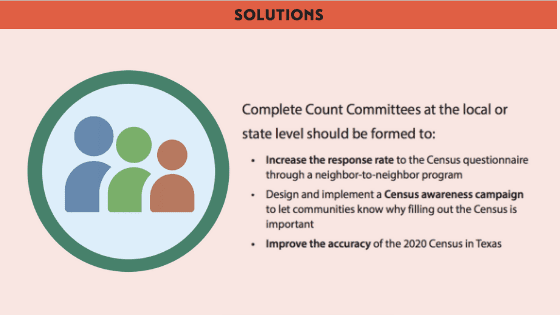In less than a year, the Census Bureau will carry out the constitutionally mandated count, or the Census, of the nation’s residents. The Census is supposed to count everyone living in the United States to determine representation in Congress as well as the number of federal dollars sent to local communities to improve our nation’s health care, housing, education, transportation, and more. Being undercounted by even one percent in 2020 could result in a significant loss in federal funding for Texas — at least $300 million a year.[1] Without these federal funds, cities or counties would likely have to fill in the funding gaps for the next decade or go without services for their community.
In 2010 Census, Texas saw significant undercounts in local communities across Texas, including in large metro areas, college towns, rural counties, and communities along the Texas/Mexico Border. Texas is at risk of an even larger undercount in the 2020 Census. Today, 25 percent of Texans (over 6 million people) live in hard-to-count neighborhoods, areas where past self-response rates have been relatively low.[2]
Texas communities are working on counting everyone. Given the geographic, cultural, economic and regional differences between local communities, each area must determine the best methods for engaging their community members to participate in the 2020 Census. To aid in this process, we have developed a set of recommendations to support local communities to prepare for the 2020 Census:
Developing Local Support
- If you do not have a complete count committee (CCC), connect to Texas’s Regional Census Bureau Specialist Rebecca Briscoe and CPPP at our 2020 Census webpage for materials. CPPP can also connect you to other resources and partners that can assist.
- Identify city or county influencers—mayors, council members, or county judges—who can to set the 2020 Census as the priority for a local community. Meet with them and take our materials to convince them how important the 2020 Census is for your community.
Developing a Plan
- Identify barriers to a complete count by holding public meetings or focus groups with community-based organizations to understand potential challenges and solutions needed to reach a complete count, especially in your hard-to-count neighborhoods.
- Identify trusted messengers from your community, including local leaders, community-based organizations, service providers, and faith leaders, and invite them to be a part of the planning process of your community’s complete count effort.
Developing a Local CCC
- Establish a Local CCC to increase awareness and motivate residents to respond to the 2020 Census. Subcommittees could include government, education, faith-based, media, community-based organizations, and business— each recruiting trusted messengers in those sectors to do direct outreach.
- Establishing a local CCC is only the first step. When possible, local governments should commit resources such as a full-time staff person to support the local CCC and allocating city or county dollars to help implement outreach efforts.
- To perform a robust 2020 Census outreach effort, you will need resources. Connect with local chambers of commerce, businesses, and philanthropy or foundations serving your area and ask them to help fund your community’s 2020 Census plan.
A local CCC plays a key role in achieving a complete count because each Texas community is unique. Local communities can develop a robust plan to educate Texans in their communities on the 2020 Census and increase the response rate. Time is of the essence, get your local community committed to the 2020 Census. Click here to view two-pager to share in your local community.
[1] Reamer, A. (2018). Counting for Dollars 2020 Report #2. GW Institute of Public Policy. https://bit.ly/2pJmgkr
[2] Romalewski, Steven & O’Hare, William. Center for Urban Research, CUNY Graduate Center, analysis of U.S. Census Bureau, 2012–16 American Community Survey.
